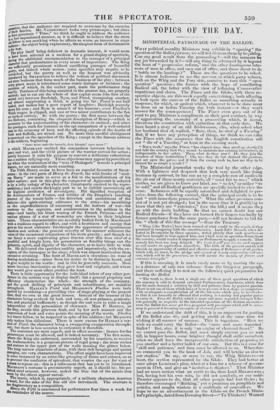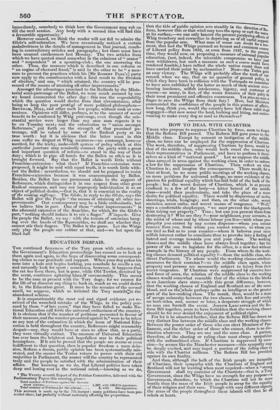TOPICS OF THE DAY.
MINISTERIAL PATRONAGE OF THE BALLOT.
WHAT political morality Ministers may exhibit in " opening" the question of the Ballot just non', we will not distress them by inquiring. Can any good result from the proceeding ?—will the measure be any jot forwarded by it ?—will any thing be advanced by it beyond the hoax of " progressive reform," and the other humbugeous inte- rests of men in office, and men out of office, and those about to do " battle on the hustings ?" These arc the questions to be asked. It is almost ludicrous to see the account to which party writers, both on the Whig and the Tory side, contrive to turn this " open question" question ; the former with the hope of conciliating Radical aid, the latter with the view of inflaming Conservative impatience and alarm. The Times and the Globe, with these re- spective objects, are this week equally entertaining; both affecting to look upon the success of the Ballot as something actually in suspense, for which, or against which, whatever is to be done must be done on or before Tuesday the 18th instant—or they won't answer for the consequences ! The Times even goes out of its road to pay Ministers a compliment on their past conduct, by way of aggravating the enormity of a proceeding which, it seems,
threatens the constitution with extinction at that early date. We have heard a story of an old Irishwoman, who, when asked what
her husband died of, replied, " Sure, then, he died qf a Tuesday." But, if we have any perception of things, we think we can calm the Times with the assurance that the English constitution will not " die of a Tuesday," at least in the ensuing week.
" Not a week," says the Times, "has elapsed since they stood up stoutly (!) and told the country that they meant to maintain her existing institutions, as
indispensable to her safety. Then, whist do they now ? Do they join the invaders of those institutions ? Oh, no: they do but disband the garrison, and set open the gates; and if then the enemy rush in, how arc they to be blamed. for so simple a result ? "
The Ministerial journalist works the tool by the other edge. With a lightness and despatch that look very much like doing business by contract, he has run us up a complete row of castles in the air out of these scanty materials, all " most fair to see ;" which castles, we are give» to know per label, are " to let," or rather "to be sold," and all Radical gentlemen arc specially invited to view the same. Reformers will be equally astonished and delighted to per- ceive, from the following extract, that the principal castle is to be had " with hnmediate possession." What the other premises con- sist of is not yet divulged; but in the mean time it is gratifying to know that they are " extensive," (sec the bill,) and it seems they go with the main building. So that we cannot doubt but our Radical friends—if they have not burned their fingers too badly by former purchases from the same party—will not hesitate to bid for the " whole of this fine message"—from the Treasury.
" They [the Tonics] have been warned of what could he the result, if they persisted in tampering with the constituencies. Lord John Russell, when de- feated in Devonshire by those agencies, stated plainly that such practices as had been brought to bear against him, ;Ind which were in operation throughout the country, would render it imperative on Parliament to apply a remedy. That remedy has been too long delayed. 11-e /rust it Ica now rceeive such support as will render its (indication immediate. The ISth of the present month will furnish an opportunity of cordial and effective union of Reformers of all grades, which will, we trust, be the pledge and earnest if hearty colliwration and suc- cess, whirls will be the precursor, as it will secure the local's, qf future and extensire triumphs."
if this is amusing, it is made vastly more so by moving the eye to a distance of only two columns from the foregoing paragraph, and there suffering it to rest on the following quiet preparation tbr barking Me Ballot.
" The truth is, there is not a single one of those great questions of which the urgency is said to demand extended Parliamentary franchises, which does not flu. more demand a solution by skill and patience than by popular passion. There isnot one of them which hasyet been resell .211 n a shape so *molt Lie— with so adequate a consideration of all the interests which may be ;10,1,01— as that it can honestly be affirmed that nothing is waiting but popular power to carry it. Even the Ballot, which is more and more regarded amongst Libe- rals generally as requisite to the intended operation of the Reform measure— even the Ballot has Iter r yet been proposed with provisions which will lie neces- sary to prevent it becoming an engine of etreMru/ fin,/ f/."
If we understand the drift of this, it is an argument for putting off the Ballot sine die, and getting credit at the same time for wishing it all manner of success. This is ingenious. "How we wish we could carry the Ballot—the i more and more regarded' Ballot ! But, alas, it is only i an engine of electoral fraud ! ' So we cannot pass the Ballot, and must simply entreat you to wait till, in happier hours, some brighter thought shall strike ourselves, when we shall have the inexpressible satisfaction of proposing to you another and a better ballot of our own. But this is a ease for skill and patience,' and time must be allowed to us. Wherefore we commend you to the book of Job, and will betake us also to our studies." So say, or seem to say, the Whig Ministers—at least, the section represented by the Globe. They had better at once adopt LON! LICIE'S plan, when at a loss for a scheme of govern- ment in 1788, and give an "iandathot to thinkers." That Minister had no more notion what on earth to do, than Lord AIELBOURNE but, having lost his own wits, he did not conclude, as our noble Premier appears to do, that all other people had lost theirs ; he therefore encouraged "thinking," put a premium on pamphlets and articles, and sought wisdom in a multitude of counsellors. We hope to see an advertisement in the Globe on the French Minis- ter's principle, dated from Downing Street—" To Thinkers ! Wanted
immediately, somebody to think how the Government may rub on till the next session. Any body with a second idea will find this a favourable opportunity.'
However caused, we think the reader will not fail to admire the 'Globe's self-refutation. We have occasionally noticed a certain maladroitness in the details of management in that journal, result- ing in contradictory articles and paragraphs ;. but there must have been unusual carelessness last Monday. The two articles from which we have quoted stand somewhat in the relations of " orator" and " respondent" at a spouting-club ; the one answering the other. Thus, the measure which is described in one column as " an engine of electoral fraud," is said in the other to be " a mea- sure to prevent the practices which his [Sir ROBERT PEEL'S] party now apply to the constituencies with a fatal result to the freedom of election," and one, " which attained, the country will be pos- sessed of the means of attaining all other improvements." Amongst the advantages promised to the Radicals by the Minis- terial semi-patronage of the Ballot, we were much amused by one we heard enumerated the other day : this was the respectability which the question would derive from that circumstance, after being so long the poor prot6g6 of mere political philosophers- BENTHAM, MILL, and other such low people, without rank or con- nexions. Opinions will differ, perhaps, as to the amount of moral benefit to be conferred by Whig patronage, even though the sub- stantial service were larger than any sane man expects it to be on Tuesday next ; and the exhortation to " union amongst Reformers," put forth on the strength of that promised pa- tronage, will be valued by some of the Radical party at its true worth : but it is obvious that the latter must in this case suffer no disgust at Whig meanness—no contempt, however merited, for the tricky, nake-shift system of policy which at this ?articular juncture may nominally connect the party with a great and important question of reform—to stand in the way of their duty; which is to pipe all hands for the Ballot as often as it is brought forward. Say that the Ballot is worth little without Franchise-extension : what then ? If Franchise-extension were proposed, it might be said with equal truth, it is worth little with- out the Ballot : nevertheless, we should not be prepared to resist Franchise-extension because it was unaccompanied by Ballot. Besides, the Ballot has one paramount claim to the support of Reformers, which distinguishes it in one respect from other great Radical measures, and may not improperly individualize it as an object of political desire,—that is, that it is essential to the reality of the existing suffrage. The Globe, in reply to the Globe, says the Ballot will give the People " the means of attaining all other im- provements." Our contemporary may be a little enthusiastic, but we believe him in part. One of these " other improvements " is the aforesaid extension of the franchise, for which, for the Globe's part, " nothing should induce it to stir a finger." N'importe. Give the people the Ballot, we say : with the terrors of ostracism hang- ing over the heads of the Squeezables, we shall see whether they cannot stir their fingers. The Ballot is the game. Let the Whigs only play the people one rubber at that, and—we bet upon the black ball.



























 Previous page
Previous page